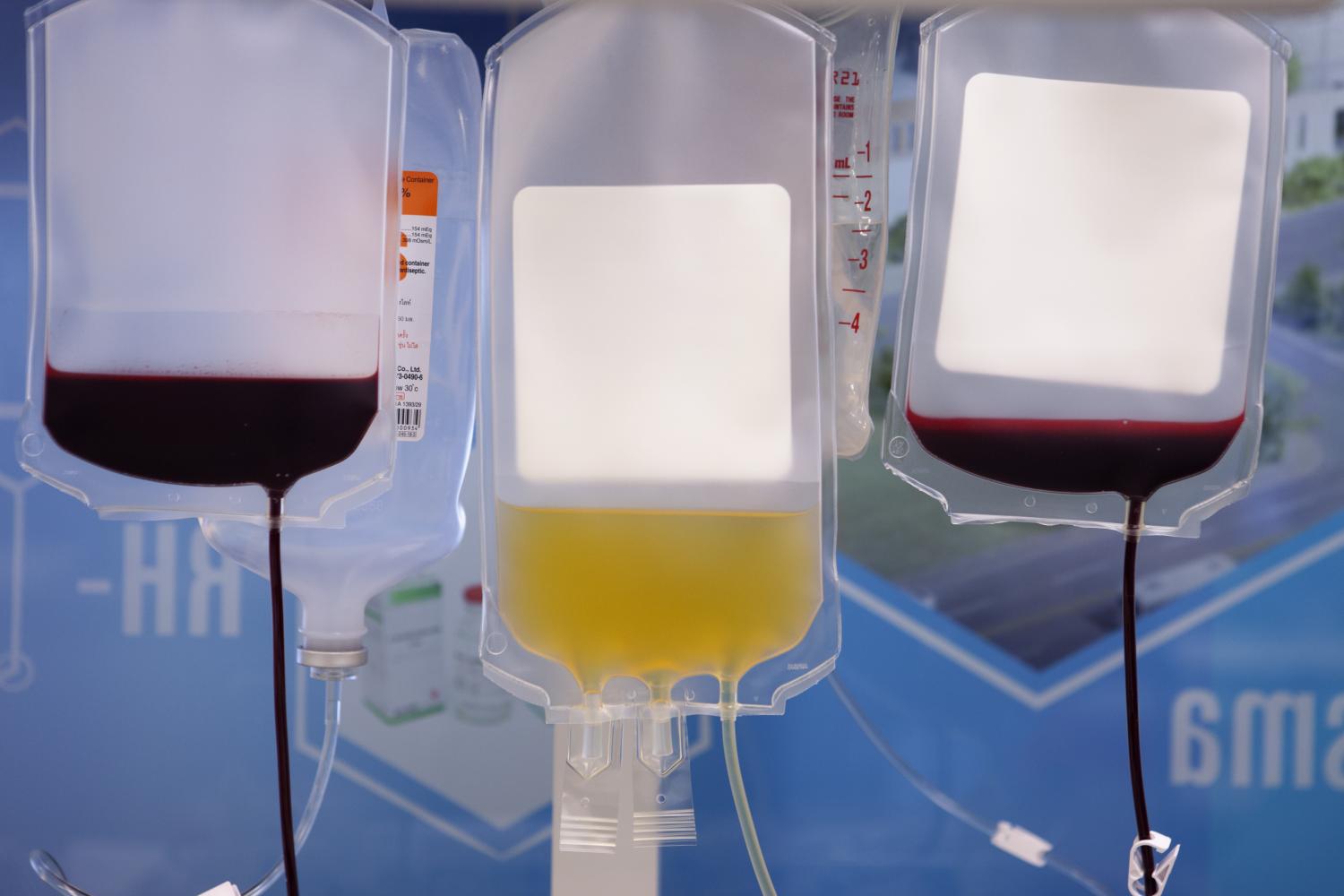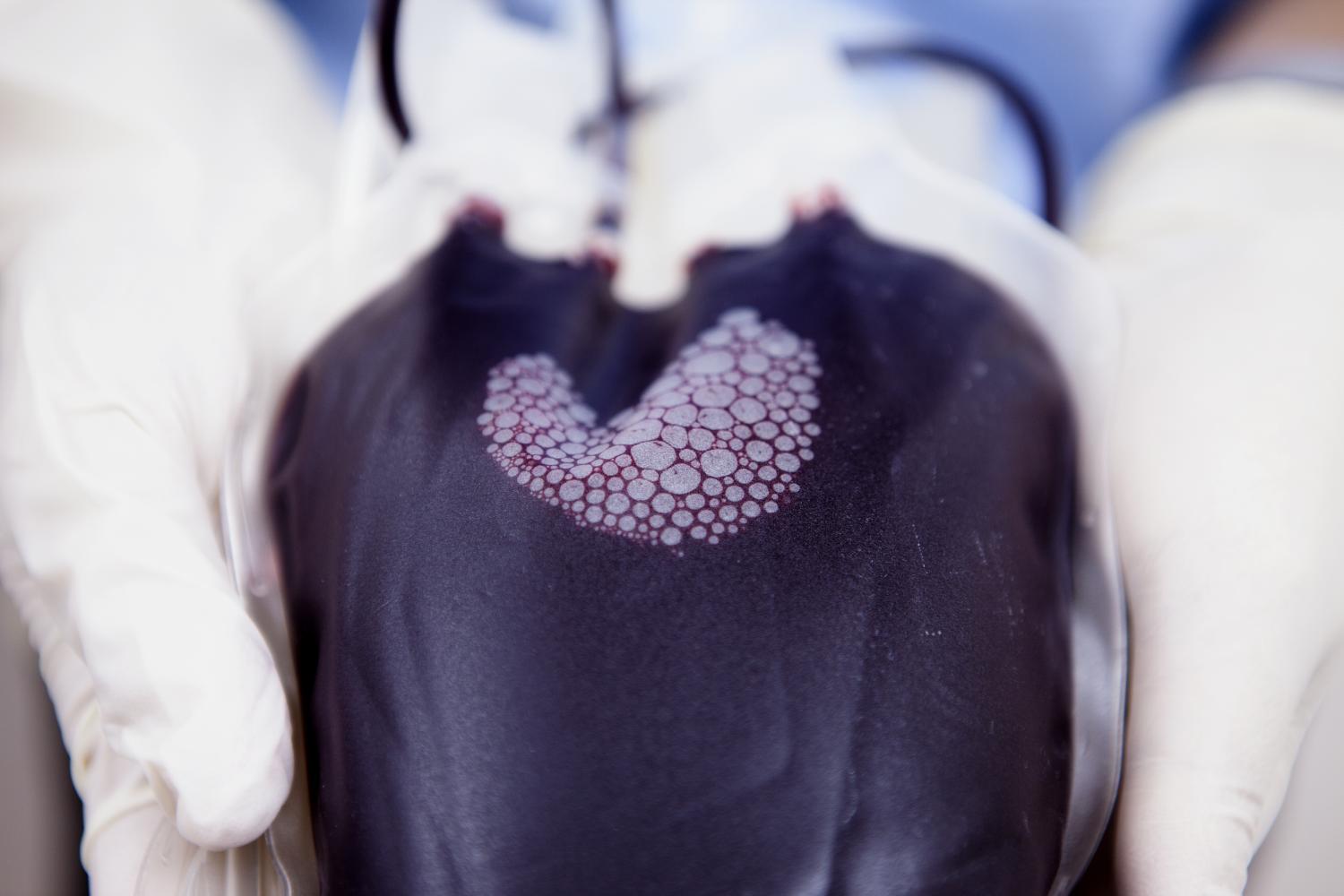Despite the soft lockdown and home-isolation measures in place, Siriruk Tientong does not hesitate to leave the house. Her mission is clear: to donate blood -- an activity the office worker has been engaged in regularly for the past four years.
"We come with a desire to help people," said Siriruk. However, this time she came with her siblings after learning about the dangerously low blood supplies at the National Blood Centre.
"We've prepared ourselves by eating healthy food and taking good rest prior to donating blood. To reduce the risk of Covid-19 infection, we drove from home rather than using the BTS or MRT to make sure our blood is clean and safe for patients. The centre itself has standard measures in place to keep visitors safe," said Siriruk, who serves as an assistant to a managing director at World Pro Travel.
The Thai Red Cross Society is facing a blood shortage crisis as people do not want to leave their homes amid the Covid-19 outbreak. The number of blood donors at its National Blood Centre has dropped by more than 50%. While the national daily demand for blood is 2,500 units, the National Blood Centre can now contribute only 1,500 units, which means those with blood-related diseases are at risk. As a result, hospitals around the country have postponed all non-essential surgeries and operations to manage their blood stocks effectively.
"After we encouraged people to donate blood, the number of donors increased last month but it is still not enough. To reduce the demand for blood during this time, doctors have decided to use medicine to alleviate symptoms rather than opt for surgery. This isn't good for the future health of patients but doctors have to prioritise cases like massive bleeding, labour-related difficulties or those involved in road accidents," said Pawinee Kupatawintu, deputy director of the National Blood Centre at the Thai Red Cross Society.

A donor at the National Blood Centre. (Photos by Jetjaras Na Ranong)
Far away from Bangkok, 12 provincial blood centres are also experiencing a supply crisis due to the lockdown measures as they have not received donations from other provinces. The provincial blood centre network normally distributes 1,400 units of blood but at the moment they are only able to meet 60-70% of daily needs.
In the South, the beach towns of Phuket, Songkhla and Nakhon Si Thammarat are also encouraging healthy people to come out and donate blood. The popular resort town of Nakhon Ratchasima in the Northeast is also facing the same dilemma.
"We have to distribute more blood to the provincial centres to solve the shortage crisis. Regularly, hospitals will have the emergency stocks to use for the next few days which means we usually have time to arrange delivery services," Pawinee said.
"We have our own transportation system, so the closing of public transportation has not affected us. Moreover, we can also make use of domestic flights to transport blood to the countryside."
At present, people suffering from thalassemia, leukaemia, haemophilia and thrombopathia are at the top of the waiting list for blood transfusions. This is the only way to save their lives.
"According to the reports by the Ministry of Public Health, there are around 15,000 thalassemia patients with severe symptoms who require blood transfusion twice a month. Each patient must receive two units of blood so they can live a normal life," Pawinee said.
"Blood transfusion is also essential for cancer patients because chemotherapy courses can cause fatigue and lead to fatal bleeding."

People check their blood pressure prior to donation.
During a recent visit, Siriruk admitted that the National Blood Centre was not as crowded as usual apparently because people are worried about the risk of contracting Covid-19.
"I typically spend two hours waiting in a queue but today it took only 30 minutes," she said.
The National Blood Centre is now working hard to ease people's worry of contracting the coronavirus though. Following guidance from the Department of Disease Control, the National Blood Centre is using disinfectant and alcohol to sanitise the floor and frequently-touched surfaces and medical appliances as viruses in the air are killed by ozone sterilisation. Moreover, all donors are required to wear a face mask and take a self-screening test to ensure they are not at risk of Covid-19.
"We take the temperature of all visitors at the entrance and follow social distancing practices to ensure safety. To protect the patients, all donors are also required to take a self-screening test for Covid-19 which cannot be tested for in the blood. We have to trust them. This is to make merit and there is no need for people to conceal their health history. For donors who do test positive for Covid-19, they can donate blood one month after a full recovery," Pawinee said.
Siriruk's brother is a good example of self-screening. He was studying in Guilin, China, but returned to Bangkok in February.
"His blood tested negative twice for Covid-19 and he also produced a medical certificate during the screening test," Siriruk recounted.

Donated blood can be divided into three components — red blood cells, platelets and blood plasma.
"He has convulsions but his health has been improving for several years. A doctor explained that this posed no risk for blood recipients but that he may relapse after donating blood. A doctor allowed him to make a decision and he said 'yes' without hesitation."
The donation process takes about 15-30 minutes and people can donate between 350cc to 450cc of blood, depending on their weight. Thanks to advanced technology, all units of donated blood are tested for multiple diseases like viral hepatitis B and C, HIV, and syphilis.
Donated blood is divided into three components -- red blood cells, platelets and blood plasma. The transfusion of red blood cells can help those with chronic anaemia and patients with acute blood loss.
Platelets are usually utilised in cancer treatments and surgeries like organ transplants to control bleeding in the body while plasma is commonly transfused to those with severe liver disease or multiple clotting factor deficiencies and burn injuries.
"A donor can donate 500cc of plasma every 14 days, which means the National Blood Centre can provide 700 litres of plasma per month. Besides being used for blood transfusions, some of the plasma is also used to produce three drugs -- albumin, a protein supplement for those suffering from liver disease, factor VIII concentrate, which is used to stop bleeding in haemophilia patients, and immunoglobin, which helps boost immunity for those suffering from viral hepatitis B," Pawinee added.
When a vaccine is developed, the centre is planning to join hands with the Ministry of Public Health to conduct research on blood plasma from recovered Covid-19 patients. It is believed that treatment using blood plasma may become a life-saving solution for severe cases, according to Yong Poovorawan, a medical professor in paediatric hepatology and also an expert in virology at Chulalongkorn University.
"Donors can register online via our website and they will be tested for the virus 14 days prior to donating blood. The donors must be between the ages of 17 and 60 and they must weigh more than 50kg and not have any chronic diseases like high blood pressure or diabetes. For those infected with viral hepatitis B, we've used their blood plasma to produce serum," Pawinee said.
To provide convenience for the public, the centre is also offering mobile donation services by visiting condominiums, villages and offices to collect blood for a group of 20-30 persons. However, people who wish to donate privately can make an appointment with the National Blood Centre.
"Donors are required to update their phone numbers so that we can send an SMS and encourage them to donate blood. This is a way to directly communicate with donors to solve blood shortages at this time," Pawinee said.
Siriruk added: "While the country is undergoing the crisis, this is the easiest way to make merit without paying anything."

